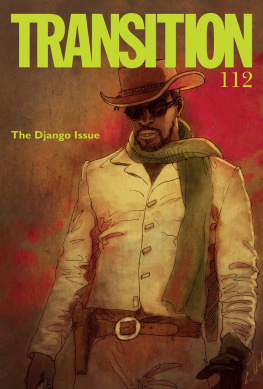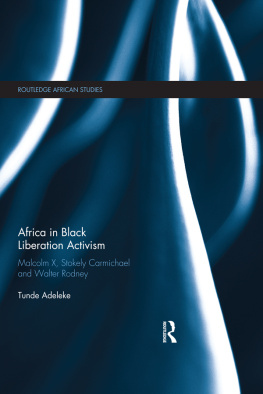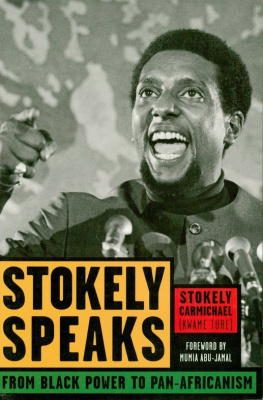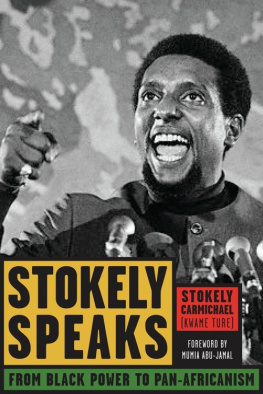CONTENTS
Transition seeks the intersection between blackness and the world of clinical psychology.
by Carina del Valle Schorske
Before he became infamous for his crusade against comic books, Dr. Fredric Wertham collaborated with Richard Wright to found Harlems Lafargue Clinic. Gabriel Mendes recounts the history and successes of this early attempt to provide accessible psychological care to the black community
Tying it to the trope of madness in rap music, Jonathan Metzl details how schizophrenia came to be defined as a mental illness, and how it was never far from folk notions of race-based pathology
Celebrated photojournalist Robin Hammond shares photos from his project Condemned, which documents human rights abuses against mentally ill Africans, often by their families, caregivers, and those entrusted with their healing
In Carina del Valle Schorskes reflection on two major conferences, nearly a dozen leading black psychoanalysts share how being African American hasor hasntshaped their clinical practices and approaches to psychoanalysis
Although the activism of Martin Luther King, Jr. and Malcolm X continues to receive the most attention, Fredrick Harris argues that James Baldwin is better situated to explain why black Americans continue to be pressed to the margins of American society
Womens rights activist jewel bush shares insights about global blackness gained through her friendship with Samra, a member of the marginalized and oft-mistreated community of black Palestinians
Yohuru Williams interviews Peniel Joseph about his new book Stokely: A Life and his decision to focus his recent scholarship on Stokely Carmichael, the elusive and controversial Prime Minister of the Black Panthers
Fiction
by Kabu Okai-Davies
Undertaking a detailed exegesis of (Sittin On) The Dock of the Bay, Irene Yoon speculates about why Otis Reddings last song was such a crossover success, and what it might tell us about a great talent whose life was cut tragically short
The celebrated jazz musician, composer, and professor of music Vijay Iyer talks with Krishna Lewis about his musical influences and the implications of being an Indian American adept of a black American musical genre
Finding links between Tarantinos Django Unchained and Kara Walkers A Subtlety, Catherine Keyser looks at how metaphors of sweetness and delectability shaped white understanding of black bodies in the slave economy of the Souths Sugar Kingdom
Lara Stein Pardo reviews artist Christopher Coziers recent Art Basel Miami exhibition, The Arrest, exploring how it comments on themes of mass incarceration and the tension between the real Caribbean and the imagined Caribbean of touristic fantasies
: Illuminary Luminating (detail). Mixed media collage on paper. 50 50 in. Courtesy of Derrick Adams and Hales Gallery, London. 2013 Derrick Adams.
Introduction
Carina del Valle Schorske
IN HIS EXCAVATION of the history of the Lafargue Clinic in Harlem, Gabriel Mendes enters into the paradox of a world in which the mental health of African Americans was either an invisible, underground absence or something over which many professionals in the human sciences obsessed. He is describing the United States of the midcentury, but this paradox has proven remarkably durable both in the Americas and in other historically colonial cultures. Both perspectives deny the connection between mind and world that is the ground zero of mental health.
But even when this connection is denied or attacked, it continues to communicate a powerful charge. Jonathan Metzls deep reading of the trope of schizophrenia in rap music elaborates this wisdom: if racism is, as Martin Luther King, Jr. put it, a mass psychosis, then black madnesswhether inborn or bred, clinical or metaphoricalis not only a natural response to this psychosis, but an argument about the natural responsiveness between self and society, minority and majority.
Robin Hammond exposes the nightmarish side of this feedback loop in his documentation of the lives of the mentally ill in South Sudan and Somalia. It is always a risk to disseminate images of this nature, reinforcing, as they seem to, notions of African abjection. But the inhumanity he witnesses is not just an African problem. In the United States, the prison of Rikers Island has the notorious distinction of being the largest psychiatric institution in the nation; 4,000 of its 11,000 inmates have been diagnosed with a mental illness. In July of this year, the New York Times published an investigative report on the rampant guard-on-inmate violence that takes place at Rikers, aimed disproportionately at those suffering from psychological conditions: brutal punishments for suicide attempts and stomach-turning incidents like the following, in which correctional officers handcuffed [inmate Andre Lane] to a gurney and transported him to a clinic examination room beyond the range of video cameras where, witnesses say, several guards beat him as members of the medical staff begged for them to stop. Accounts like this dispel any defensive instinct to say that the people shackled to the ground in Hammonds photographs are an African anomaly. In the absence of activist institutions like the Lafargue Clinic, imprisonment steps in as the most primitiveand most ubiquitousmethod of responding to populations that inconveniently express or fail to tolerate conditions of war, poverty, and oppression.








 TRANSITION 115
TRANSITION 115